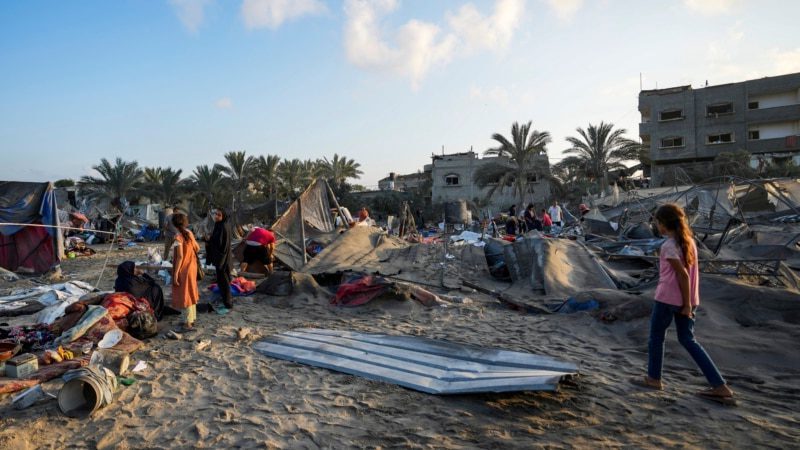BTN News: In the early hours of Tuesday, a devastating Israeli airstrike hit a densely populated camp for displaced Palestinians in Gaza, killing at least 40 people and injuring 60 others. The strike targeted Muwasi, a supposed humanitarian zone along the enclave’s coast, designated by Israel as a refuge for civilians amidst the ongoing war with Hamas. While Israel claimed the attack aimed at “important” Hamas militants, the militant group has denied these allegations. As the conflict escalates, the war continues to exact a severe toll on Gaza’s civilian population, sparking widespread concern and condemnation from humanitarian organizations.
Humanitarian Crisis Deepens in Gaza
The Israeli airstrike on Muwasi, a crowded camp filled with makeshift tents, marks one of the deadliest attacks in the area to date. The assault came just after midnight, igniting fires and leaving behind three massive craters. Rescuers, including the Defense Civil workers operating under Hamas’ governance, were seen digging through sand and debris with bare hands and makeshift tools, searching for survivors and recovering bodies, including those of entire families.
A witness, Attaf al-Shaar, a refugee from Rafah in southern Gaza, described the horrific scene: “People were buried in the sand. They were recovering body parts,” she told an Associated Press reporter at the site. Hospitals across Gaza, including Nasser Hospital in Khan Younis, were overwhelmed as victims were rushed in, further stretching already fragile medical facilities.
Israel and Hamas Blame Each Other
The Israeli military stated that the airstrike targeted a Hamas command and control center in Muwasi, utilizing precision munitions and aerial surveillance to minimize civilian casualties. Israel has maintained that it seeks to avoid harming civilians and blames Hamas for placing its military infrastructure in residential areas, including homes, schools, and mosques.
Hamas, however, strongly denied the presence of its militants in the camp. In a statement, the group accused Israel of deliberately attacking civilians and called for international condemnation of what it described as a “war crime.” Neither side has provided concrete evidence to substantiate their claims.
A War-Torn Gaza Faces Growing Despair
The ongoing conflict has plunged Gaza into a dire humanitarian crisis. With around 90% of Gaza’s 2.3 million residents displaced, many have been forced to relocate multiple times due to continued Israeli military operations. Muwasi, a so-called “humanitarian zone,” has become a focal point for displacement, with hundreds of thousands of civilians seeking refuge there despite occasional Israeli strikes on the area.
International aid groups are struggling to provide even basic necessities to those in Muwasi. Israel’s sporadic attacks on the camp have further complicated their efforts. The Ministry of Health in Gaza reports that over 40,000 Palestinians have died since the conflict began, though these figures do not differentiate between civilians and combatants.
Escalating Tensions Hinder Diplomatic Efforts
While diplomatic efforts led by the United States, Egypt, and Qatar to broker a ceasefire and secure the release of hostages have persisted throughout the year, talks have repeatedly stalled. Israel and Hamas continue to accuse each other of making unreasonable demands. Meanwhile, the war’s toll on Gaza’s infrastructure has been catastrophic, pushing the territory towards the brink of famine, according to international authorities.
Disruptions to Vital Aid Services
In a separate incident, the United Nations Relief and Works Agency (UNRWA) reported that a convoy participating in a polio vaccination campaign was detained by the Israeli military for over eight hours. Despite prior coordination with Israeli forces, the convoy was stopped at the Wadi Gaza checkpoint. “The convoy was detained at gunpoint shortly after crossing with threats to detain UN staff,” wrote UNRWA Director Philippe Lazzarini on social media platform X. Heavy machinery was used to damage the agency’s armored vehicles.
The convoy eventually returned to a UN base, but it remains uncertain if the campaign, crucial for immunizing 640,000 children after the first polio case in 25 years, would resume.
Calls for Immediate Action Amid Uncertainty
The situation in Gaza remains dire, with humanitarian organizations urgently calling for a ceasefire and unimpeded access to provide critical aid. The UN and other international bodies continue to express alarm over the deteriorating conditions and the potential for widespread starvation if the conflict persists.
Conclusion: A Region in Crisis
As Gaza reels from the latest deadly airstrike and struggles with a humanitarian catastrophe, the world watches with concern. Both sides remain locked in a cycle of violence and recrimination, with no immediate end in sight. The consequences of the conflict are felt most acutely by Gaza’s civilians, who are caught in the crossfire and face an uncertain future.


